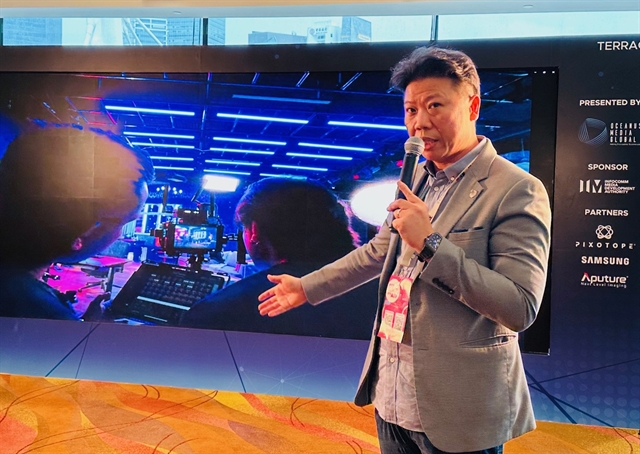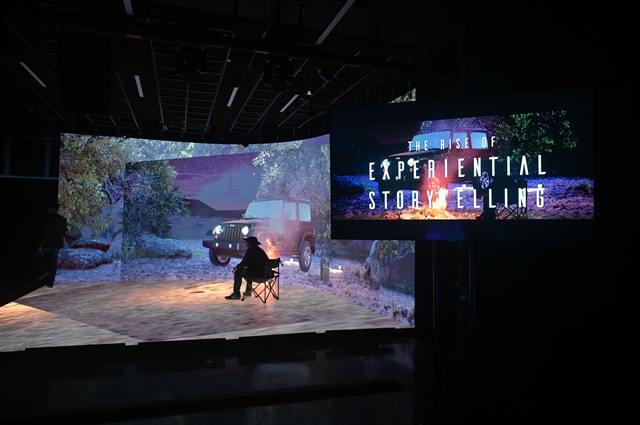Weather:
- Ha Noi 26oC
- Da Nang 27oC
- Ho Chi Minh 26oC
In the framework of the ongoing 10th Singapore Media Festival, Việt Nam News reporter Lê Hương chats with Nick GC Tan, Chief Executive Officer of Oceanus Media Global, a recipient of Infocomm Media Development Authority’s (IMDA) 2022 Virtual Production funding.
Oceanus Media Global (OMG) is an augmented reality (AR) production studio in Singapore, a pioneering venture in Southeast Asia in Virtual Production.
With an investment of S$5 million, this studio is Nick's brainchild, reflecting his commitment to innovation and excellence in immersive media production. The studio is equipped with advanced virtual production technology, mirroring the high standards seen in internationally acclaimed TV series.
The studio has offered experiences in various domains, including corporate events, E-Sports, entertainment, and TV production.

- How do you describe the importance of the IMDA’s funding for your company?
- For IMDA as a media authority, their main job is to facilitate, to push the industry, to create funds to support content creators and producers.
At the same time, it also supports the trainers to have education for the people. However, the infrastructure is always established by independent companies like us.
It's always this public-private partnership, together with content creators and producers and schools, to drive the whole ecosystem as a unit.
That's how IMDA is the facilitator and plays a key role in this whole ecosystem.
- Have you ever cooperated with any Vietnamese company?
-Yes, we have worked with Capital Studio in Việt Nam and with Refinery Media to do camera visual effects especially for a segment for Apprentice, a film on Netflix where we shot scenes that were not possible to film in real life.
That is our partnership with Capital Studio, of which today they were announcing the launching of a new studio with X3D.
Our partnership with them has been very exciting because in Vietnam there's a lot of push towards virtual production, and for us, we always see ourselves as one of the partners to collaborate. Likewise for Indonesia as well.
- Where do you think virtual production will be in five years?
- Well, we think that in five years maybe it will become the norm. It will become a standard tool that filmmakers will understand. With the amount of innovation and push right now, I think in the future, filmmakers will just see virtual production as one of the ways to create their content.
Just like how today, the OTT platforms are looking at it. If you look at OTT platforms like Netflix and Naver, they are all looking into that. Everyone is already starting to put a certain percentage, even with Mediacorp.
With OMG, we have already started our footprint together to do virtual production for a long drama series, and are looking into some parts of the components to be done. I would say that with more exposure and more collaborations and partners, this production will become a common space. Right now, it still looks like a tech.
In the future, you will never say that's a tech, just like a phone. You will never talk about a phone anymore. It's the norm. I see virtual production being the norm in the next five years and it's going into a much more normalised state.
- Is your training also applied to the actors?
Our master class is specific to only producers and directors, but there are other open master classes that are open to everyone.
Our programme was very specific just for producers and directors, because they are the ones that we need to convince first, the actors will follow what the directors say.

- What do you think about competing with big companies globally?
We don't think that there is a need to compete because, to be honest, we are learning from one another. I would say that there will be space for companies in Southeast Asia and Singapore to grow.
The OTT scenes are very, very active as you can see from the film market. If you just turn anything from 1% to 5% onto virtual production, that's a lot to do, just by numbers.
In my opinion, I wouldn't say there's much competition.
I would say more partners and collaboration, because I see that every country would have to upscale virtual production and make the cost lower. One of the main issues is cost and accessibility, for studios to distribute.
So having access to the sound stage and having to bring the cost down to a more palatable price is the main thing. That's why going into generative AI is definitely the next stage for content creators to make costs lower.
All these scenes are created from scratch, but eventually, I would say that maybe a certain small amount can be generated by AI, which would also bring the cost lower and also the use of video place.
That's the reason why we wanted to have the master class.
Because we would like to help the producers and the directors understand that virtual production is not simply an LED screen, it is the whole ecosystem, the whole process, it's just a thought process for them to complete the whole ecosystem or supply chain.
- What was your role in this event?
I used to produce and direct, but now I'm pretty much looking into pushing different things because OMG is a group of different companies.
We have the producing team, we have the Unreal Engine game engine, we have the studio team, so we pretty much combined the units to create this thing.
In a way, OMG is a pretty unique company because we are creative. We are media, we are also a technology company.
This is very uncommon; we interface with a lot of big studios in different countries. There are usually different companies, but for OMG we are integrated.
That's the reason why we're able to do as much as possible to help the filmmakers, to help the producers, and directors, and also to help push the industry together with IMDA.
That's how we play our small part. VNS

